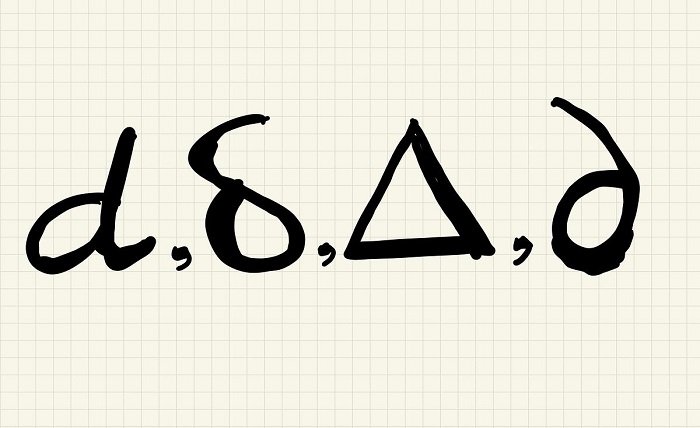Introduction
Mathematics is filled with symbols and notations that represent various concepts. One such important symbol is delta (Δ), which has multiple meanings in different branches of math. The delta math meaning can vary depending on whether it’s used in calculus, algebra, statistics, or physics. In this article, we will break down what delta represents in math, its different uses, and how it plays a crucial role in mathematical problem-solving.
What Is Delta in Mathematics?
The delta math meaning refers to change or difference. It is represented by the Greek letter Δ (uppercase) or δ (lowercase). The uppercase Delta (Δ) typically represents finite change, whereas the lowercase delta (δ) is often used in calculus to denote an infinitesimally small change. Delta is widely used in various mathematical concepts, from basic arithmetic to advanced calculus.
In algebra, Δ often signifies a change between values, such as in functions and sequences. In calculus, δ is used in limits and derivatives to indicate a very small change in a variable. Understanding the delta math meaning helps students grasp the concept of change and variation in mathematical equations.
Delta Math Meaning in Algebra
In algebra, the delta math meaning is commonly associated with the discriminant of a quadratic equation. The discriminant is calculated using the formula:
Δ=b2−4ac\Delta = b^2 – 4ac
Where a, b, and c are the coefficients of a quadratic equation in the form of ax² + bx + c = 0.
- If Δ > 0, the quadratic equation has two real and distinct solutions.
- If Δ = 0, the quadratic equation has one real and repeated solution.
- If Δ < 0, the quadratic equation has no real solutions but has complex solutions.
This is a crucial aspect of algebra as it helps determine the nature of the roots of a quadratic equation. Understanding this part of delta math meaning makes solving quadratic equations much easier.
Delta Math Meaning in Calculus
In calculus, delta math meaning is closely related to limits, derivatives, and integrals. The concept of delta (Δ) and delta-epsilon (δ-ε) definitions are fundamental in defining limits and continuity.
- Δx represents a small change in x, used in differentiation to approximate the derivative.
- δ is used in the ε-δ definition of a limit, where for every ε (epsilon), there exists a δ such that the function remains within a given bound.
- The derivative of a function is defined using Δy/Δx, which approximates the rate of change before taking the limit as Δx → 0.
Understanding delta math meaning in calculus is essential for learning how functions behave under change and for computing derivatives and integrals effectively.
Delta Math Meaning in Statistics
In statistics, delta math meaning plays an important role in understanding variation, error, and probability distributions.
- Δ is often used to represent the difference between two statistical values, such as changes in data points or population differences.
- In hypothesis testing, Δ represents the effect size, which measures the strength of the relationship between variables.
- In regression analysis, delta coefficients indicate the marginal effect of a predictor variable on the dependent variable.
This aspect of delta math meaning helps statisticians analyze data and make accurate predictions based on numerical trends.
Delta Math Meaning in Physics and Engineering
In physics and engineering, the delta math meaning signifies changes in physical quantities such as velocity, displacement, and energy.
- Δv (change in velocity) is used in motion equations.
- Δx (change in position) is used in kinematics to calculate displacement.
- ΔE (change in energy) represents energy transformations in thermodynamics.
In engineering, delta is commonly used in control systems, electronics, and structural analysis to model changes and optimize system performance. Understanding the delta math meaning in this context is crucial for scientists and engineers who work with dynamic systems.
Real-World Applications of Delta Math Meaning
The delta math meaning extends beyond theoretical math and finds applications in real life, such as:
- Finance & Economics: Delta is used in options pricing and risk management.
- Computer Science: Delta is used in algorithms to optimize data structures and computations.
- Medicine: Delta values help in tracking changes in patient health metrics.
- Environmental Science: Scientists use delta in climate change models to track temperature variations.
These real-world applications of delta math meaning show how this concept is used in practical problem-solving across multiple industries.
Conclusion
The delta math meaning is an essential concept in various fields of mathematics, including algebra, calculus, statistics, physics, and engineering. Understanding delta allows students and professionals to analyze changes in quantities, solve equations, and make data-driven decisions. Whether calculating a small difference in a function or measuring large-scale changes in scientific models, delta remains a fundamental mathematical tool.
FAQs
1. What is the meaning of delta (Δ) in math?
The delta math meaning refers to change or difference. It is used in algebra, calculus, statistics, and physics to represent variations in values.
2. How is delta used in calculus?
In calculus, delta (Δ) represents finite changes in variables, while δ (delta) is used in limits and derivatives to denote infinitesimally small changes.
3. What is the delta math meaning in statistics?
In statistics, delta represents changes in data points, effect sizes, and differences between population means, often used in hypothesis testing and regression analysis.
4. What does delta mean in physics?
In physics, delta (Δ) is used to indicate changes in physical quantities like velocity, displacement, and energy in motion equations and thermodynamics.
5. Why is delta important in real life?
The delta math meaning is important in finance, computer science, medicine, and environmental science for measuring changes, making predictions, and optimizing systems.
By understanding the delta math meaning, students and professionals can apply mathematical principles to solve real-world problems effectively. Whether in algebra, calculus, or physics, delta remains a critical concept for measuring change and variation.

